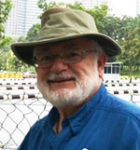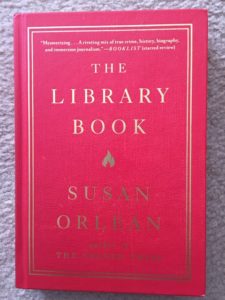The Library Book by Susan Orlean, Simon & Schuster, 2018
By Oliver B. Pollak

 RICHMOND, California – Jews love books. This book is about the largest library fire in America, the April 29, 1986 conflagration that consumed much of the downtown Los Angeles Public Library collection. The news was overshadowed by the Chernobyl disaster occurring the same week.
RICHMOND, California – Jews love books. This book is about the largest library fire in America, the April 29, 1986 conflagration that consumed much of the downtown Los Angeles Public Library collection. The news was overshadowed by the Chernobyl disaster occurring the same week.
Philip Eil in the December 21, 2018 Forward wrote in “Susan Orlean On Her Passion for Books and Judaism,” that The Library Book was “one of the most Jewish things she’s ever written,” and not just because she refers to Nazi book burning.
My relationship to Los Angeles Public Libraries goes back to the late 1950s when I rode my mid-century Schwinn (fat tire, foot brakes, no gear changing) bicycle to the Angeles Mesa Branch Library in South Los Angeles near Leimert Park, Slauson and Crenshaw. In the early 1960s I worked as a shelver at the Baldwin Hills Branch Library on La Brea Ave, and visited the Central library a few times. In my senior year in college I contemplated history graduate school, law and library school.
In 1997 I wrote “Books, Literacy are flourishing” for the Omaha World-Herald. Since then big boxes, like Borders went bankrupt and independents have evaporated as in the prophetic 1998 film, You’ve Got Mail. Nonetheless during this 2018 holiday shopping season Barnes and Noble stayed open till midnight on December 23 and 24 and publishers were unable to keep up with printing and keeping best sellers on the shelf. Being cautiously optimistic I would propound that bookstores, libraries, and literacy thrive and survive, if not quite as recognizable as in my youth. We have witnessed the beginning of the electronic information revolution, the greatest change in print culture since Gutenberg.
Orleans chronicles how the library innovates transitioning from a warehouse of books to serving preteens, teens, adults, underserved immigrants, and the homeless. Stanford scholar Sam Wineburg confronted by an emerging generation of students with smartphones pushed back in Why Learn History (When It’s Already on Your Phone) (2018) with teaching methods and curriculum that incorporate online resources. The internet is a tool to get at literature, not its replacement.
The Contra Costa County Supervisors have just introduced a lending policy eliminating library fines. They want the public to use the library and decided to remove any obstacles that interferes with that mission. Of course patrons will still be charged for the book if they don’t return it within 30 days of the due date.
I browse Friends of the Library book sales. There it was, Orlean’s The Library Book with gold embossed title on the flaming red cover, for a one-digit price. Everyone loves a bargain. It was mine. Believe it or not, money is less important than moving books and getting people to use the library. Some museums let visitors in for free. No fees. This egalitarian policy, nurturing intelligent, cultured and educated readers, will pay off in the future. Lowering the market clearing price places donated books into new hands quicker, and increases foot traffic, fulfilling the library mission.
When I purchased The Library Book, I also checked out the 615-page Bibliomysteries (2018), a volume of 16 short stories, including one by Joyce Carol Oates, about murder and mayhem in bookstores and libraries. I have been a devotee of this genre for decades. I enjoyed two chapters. But The Library Book, nonfiction, unalloyed with made up stories, other than the human condition, satisfied my need for mystery, literacy, and learning of institutional adaptation to relentless change in print culture.
Franklin D. Roosevelt stated in 1942 that “Books cannot be killed by fire. People die, but books never die.” Orlean demonstrates this for civilization in general and for the downtown Los Angeles Public Library in particular.
*
Pollak, a professor emeritus of history at the University of Nebraska Omaha, and a lawyer, is a correspondent now based in Richmond, California. He may be contacted via oliver.pollak@sdjewishworld.com